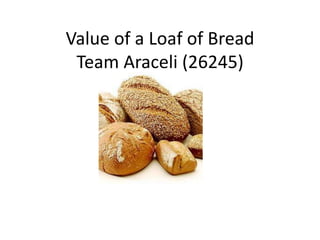Value of a loaf of bread
- 1. Value of a Loaf of Bread Team Araceli (26245)
- 2. Value of Bread? Bread is a staple food prepared by cooking a dough of a few inexpensive ingredients - flour and water and often additional ingredients. But the value of bread can be influenced by how you perceive the bread.
- 3. Values Associate with Bread The Joy of Baking Delicious Aroma of Hearth and Home
- 4. Values Associate with Bread Nutrition/Sustenance
- 5. Values Associate with Bread Religious and Cultural Value
- 6. Values Associate with Bread Medicinal Value Breads played an important role for medicinal use. In the 19th century German immigrants used special bread recipes for all kinds of maladies, especially stomach and digestive problems. Today these recipes have been all but forgotten. Breadwater for sick people. Good black bread will be sliced, toasted and soaked in boiling water. Add lemon slices-remove all seeds -, pour through a sieve and sweeten. If a fever is present, only use lemon juice. Jump to: navigation, search Penicillin G Alexander Fleming was the first to suggest that the bread mold, Penicillium, must secrete an antibacterial substance, and the first to concentrate the active substance which he named penicillin, but he was not the first to use its properties in medicine. Others involved in the mass production of penicillin include Ernst Chain, Howard Florey and Norman Heatley.
- 7. Values Associate with Bread Prisoners in the 1800’s probably valued bread differently, as living on bread and water was used as a punishment for “troublemakers”
- 8. “Bread is one of man's greatest discoveries. It is his basic food. But bread is not only food. It is one of the most omnipresent symbols in the ethnology, cultures and religions. Bread is the symbol of hope, of honest toil, and of general wealth and well-being. Rituals involving bread follow man through life, from his birth to his death. It is mentioned not only in many toasts, sayings, games and oaths but also in curses and imprecations.” --J. H. Macadam, Author A COLLECTION OF PROVERBS OF ALL NATIONS ON BREAD AND BAKING http://www.breadculture.net/web/files/81/en/poslovice_o_hlebu.pdf








